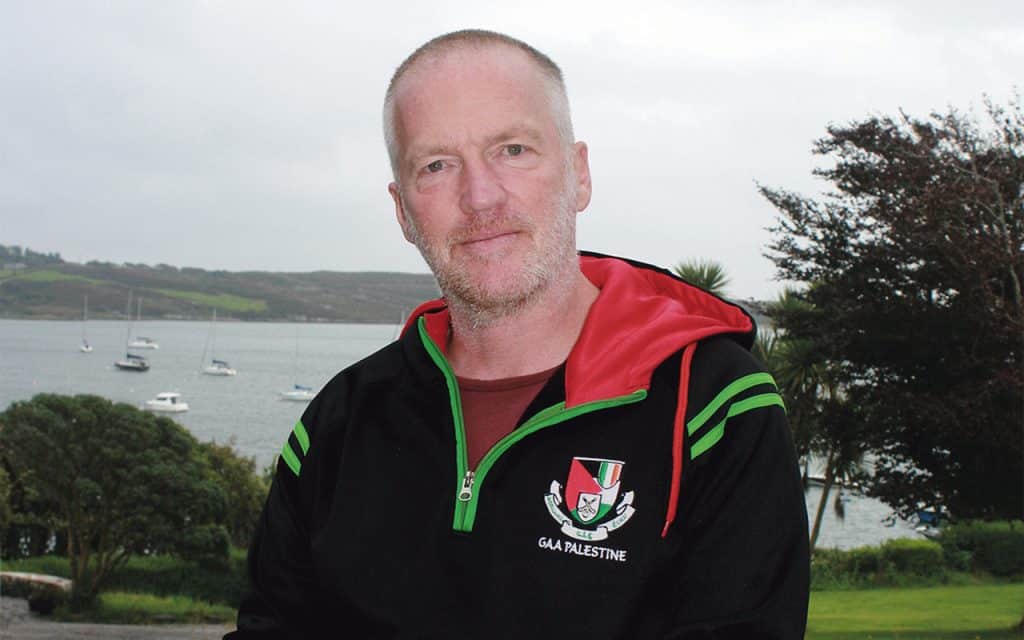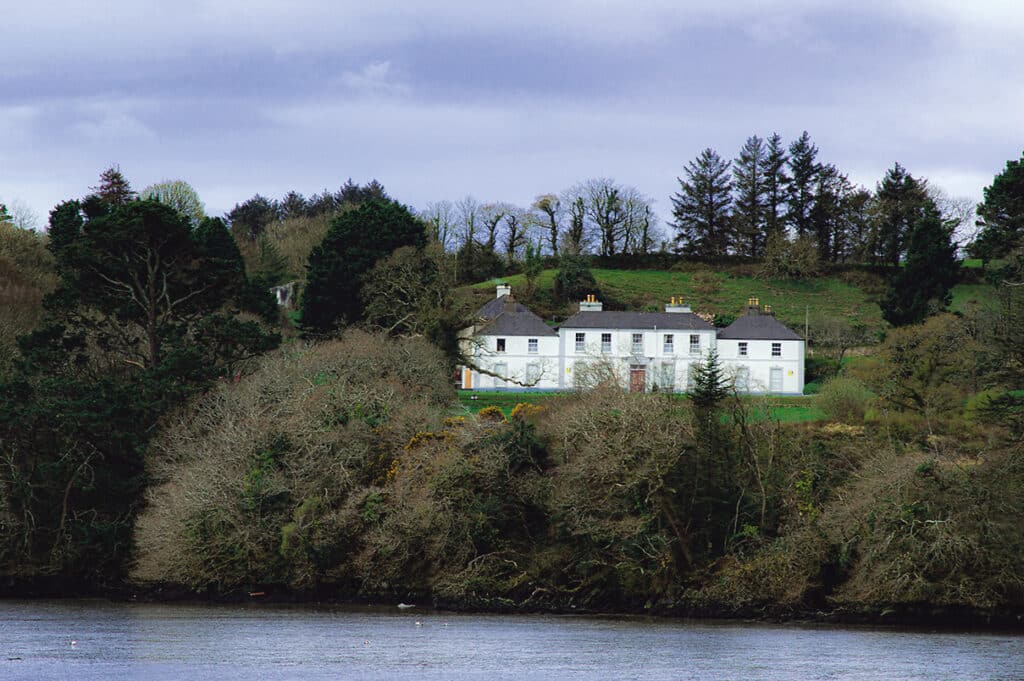“Half English, half Danish and made in Cork” is how northsider Sam Simpson introduces himself to Mary O’Brien. “Cork done the damage,” he adds laughing. Now living in West Cork and part of the West Cork for Palestine Group that organised the recent sponsored walk from Bantry to Mizen Head, raising money for Medical Aid for Palestinians (MAP), Sam is a passionate supporter of justice for the Palestinian people. He is also, surprisingly, the son of a well-known evangelical street preacher.

In 1974, Sam’s parents, Tony and Agnete Simpson, founded the Upper Room Christian Fellowship in Cork, a church committed to ‘bringing people of all backgrounds, classes and nations, the good news of God’s love, power, forgiveness, and hope, in the Gospel’.
Evangelicalism is a worldwide, interdenominational movement within Protestant Christianity that emphasises the spreading and preaching of the Christian gospel. While many evangelicals support Israel, believing that God promised the Jewish people the land of Palestine and that the creation of Israel in 1948 was a fulfillment of prophecy, there is a growing number within the evangelical faith who are critical of this stance and see it as a misinterpretation of the bible.
Some, like Sam, are still Christians but have left the confines of their church. Others, like Sam’s mother, Agnete, have become activists for Palestine within the evangelical faith.
The influence of evangelicals is not to be underestimated on the world stage. Evangelical conservatives and their political support are a major driver behind America’s support for Israel’s military operation in Gaza.
Today Sam has great respect for both his parents, who he says “have always been very open to truth and change.” His dad is now residing in a nursing home and “just wants everybody to be happy” while Sam’s mother Agnete, 89, has become a passionate pro-Palestine activist who regularly attends marches and rallies in Cork City.
For Sam personally, the pro-Palestinian movement – resulting in thousands around the world coming together to protest in solidarity – has been transformative. “Up until a few years ago I would have been a naturally suspicious person with a fairly negative view of the world,” he shares. “Palestine and the movement in support of it has completely changed my outlook on life. It has made me a lot more trusting of the inherent goodness in people.”
Over 200 people came out to ‘walk the length of Gaza’ from Bantry to Mizen Head in August, raising over €40,000 for Medical Aid for Palestinians. “One of the members of our group, age 79, cycled 66 miles in total, all the way from Coomhola to the Mizen Head and back again, and donated an extremely generous amount of money to our fundraiser, West Cork Walk4Gaza,” shares Sam.
“Another, a retired Irish army veteran from the Lebanon and a Muslim convert, fasted for 24 hours, during which time he completed the walk. He described his joy at the people he spoke to along the road, especially a German lady visiting on a four-day retreat at the Buddhist Centre in Beara. She saw the walk advertised and said it felt like a pilgrimage she had to go on, something she felt she wouldn’t have been able to do in her own country.”
Sam has trained as an international observer and human rights monitor with a Quaker organisation and has been to Palestine twice, in 2016 and 2018. He’s hoping to return there in the near future. He has never considered himself a pacifist, a position that has often been in conflict with his Christianity.
However, during his 2016 trip to Palestine, Sam encountered people from various faiths whose lasting impressions led him to reconsider his stance. “So many had been through hugely traumatic experiences – family members imprisoned and tortured, businesses destroyed, land seized – and yet they had only love to show for their adversaries,” he shares.
One encounter in particular, with a Palestinian man named Salim Munayer, had a profound effect on Sam. Salim’s family lived in a town called Lod, where Israel’s main airport is now situated. “When the Israeli state was being created, Zionist militias massacred many of the town’s residents and expelled most of them from their homes. Salim’s family survived by sheltering in the local church but they lost their home and their land and became refugees in East Jerusalem,” shares Sam. Salim went on to found a group called ‘Musalaha’, which translates as ‘Reconciliation’ in Arabic. “It brings together Muslim, Christian and Jewish people through various programmes, for example pairing Jewish and Palestinian youths on camels on desert treks where they learn to survive in the desert and to discover their shared humanity,” he explains.
Salim continues his work in Palestine today. “While he acknowledges that there can be no reconciliation without justice and no justice without accountability, Salim’s capacity for forgiveness and seeing the bigger picture was really challenging and inspiring to me,” shares Sam.
On his return to West Cork in 2016, Sam attempted to share his experience of the situation in Palestine with his church. “I tried to impress on them that, as Christians, we had a responsibility to speak out.” His church chose not to get involved, which eventually created a huge conflict for Sam, who credits his parents with instilling his passion for human rights and justice.
Tony and Agnete Simpson moved to Ireland in 1964, settling in Cork, but travelling around the country, preaching in towns, villages and at country fairs. Tony Simpson was an art student in the UK before he got his calling to become a preacher. Agnete grew up in Denmark where she experienced German occupation during World War II. The couple met at a Bible college in England.
The eldest of three boys, Sam was the only non-Catholic in a school of 700 boys on the northside of Cork City. At the age of six his initiation into school life involved getting a beating from one of the other boys and being branded a “pagan pig”. He later became good friends with his aggressor.
After that first incident, Sam never again felt like he was treated differently to anyone else in the neighbourhood. “We all had something in common. People had very little but everyone shared what they had with each other.” Sam recalls how neighbours were always in and out of each other’s houses. “There was always someone knocking on the door for some sugar or a half bottle of milk.”
While he may have fought against his parent’s faith growing up, Sam’s respect for their work with society’s disadvantaged and marginalised has never wavered. “There were always people in trouble staying at our home, which I think taught me a lot,” he says. “I felt the goodness of it and have great admiration for my parents as a result.” He did however, from as young as five, question their beliefs. “Some of it just didn’t make sense to me,” he says. ‘I remember asking my father questions about God and not being satisfied with the answers. It just didn’t sound like good news to me!
“Their views have changed a lot since then,” he adds.
Life as the offspring of an evangelical preacher was far from easy. “Sometimes my parents would literally be praying for our next meal,” shares Sam. “I’d class myself as a cynic but you know what, there were lots of miracles…we never did go hungry,” he says with a smile.
While life may have presented challenges, there were highlights too. To the younger Sam, travelling the length and breadth of the country during the summer holidays felt like a great adventure. “I just made myself scarce when the preaching started,” he says smiling.
There were occasions however when there was no escape from it. He recalls one time, around the age of nine, standing next to his father while he stood alone during the Corpus Christi procession, while the crowds knelt on Patrick Street in Cork. Corpus Christi is a Catholic celebration of the real presence of Christ in the Eucharist, a doctrine evangelicals typically reject. “I think at the time I may have admired my dad’s courage for standing up for his convictions but I definitely didn’t understand it,” he says.
He also has a memory of his mother sitting down next to a man begging on Patrick’s Bridge. “I remember the stares and the shame I felt at first, but after a while, as I listened to her make conversation with another human being, all I can remember feeling was pride.”
Sam inherited his father’s talent for art and was accepted into art college in Cork but was refused a grant because of his low school grades. While he also gained admission to two art colleges in the UK, a change in the law meant that he missed out on the grant system there too.
He moved there in 1987, finding work first in construction and later in pharmaceuticals. During this time he discovered a love for the Irish language and gained a degree in Modern History and Irish Studies from London Metropolitan University at the age of 40.
Drawn back to what he once felt the need to escape, Sam joined an evangelical church in the UK, where he met his now ex-wife. “I think at the time I felt an awful lot of guilt and pressure because of my upbringing,” he explains.
After nearly two decades away, Sam returned to Ireland with his family in 2006, settling in West Cork. When his marriage ended in 2014 he found comfort in his local evangelical church. Today however that chapter of his life is firmly closed and he has left the evangelical world behind.
Sam admits it took years to free himself from the constraints of religion. “I still believe in God and read the Bible, it inspires me,” he says. “But I see it very differently from most evangelicals.”
Almost resigned to spending life alone, in his fifties Sam met his partner Becky through a mutual friend. Now approaching 60, he enjoys a simple life in West Cork, appreciating pleasures like hillwalking and nature.
One of his deepest hopes is to witness a free Palestine in his lifetime.



